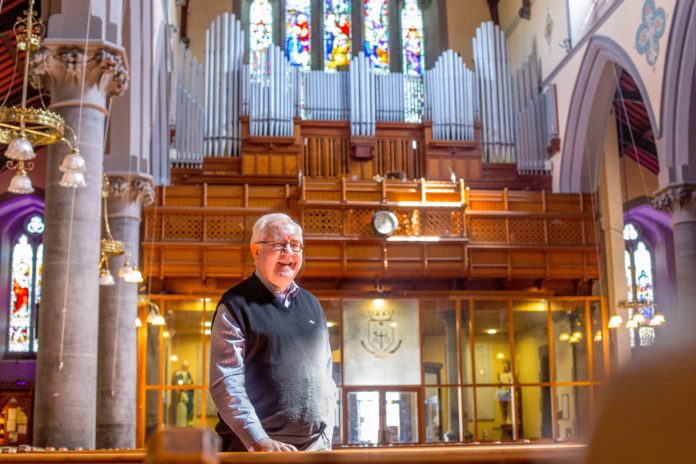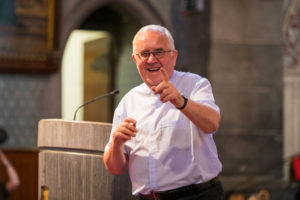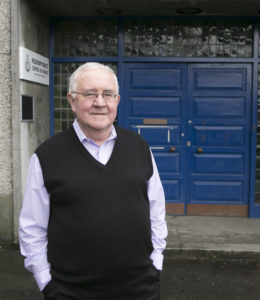
Call the Redemptorist religious order what you will – the Reds, the Fathers, the Confraternity clan – there is something of their influence in the very walls of this city that is cherished. Talking to Limerick Post’s Rose Rushe, Fr Seamus Enright, newly appointed Rector for a second term, makes sense of their place in our hearts and homes.
For the people
THERE’S a pragmatism to this Order’s way of remaining central to, active with and attractive to the faithful. Case in point, the Perpetual Novena, running June 14 to 22 this year, attracts 10,000 worshippers daily over 10 celebrations. This Limerick man smiles mischievously and observes, “We’re not good at theory, you know. We are practitioners. When St Alphonsus founded us in 1732 in the south of Italy it was to work with people whom nobody else did, people who were on the outside, the marginalised. So he focused on the countryside as the city of Naples was well enough provided for, with other religious communities in town.
“Always the challenge for us is to question who is the equivalent of the Neapolitan poor, the neglected, the abandoned. I see us being rather ordinary and having this concern for ordinary, everyday people, people who are struggling, who are on the edges.
“People can be struggling materially but also in other areas of life, spiritually, emotionally.”

Photo: Oisin McHugh True Media.
Starting out
“WHEN we came to Limerick first in 1853, we rented a house in Bank Place. That’s now going to become integrated in the Opera campus development and we are quite excited to see what is going on there. We moved here to the top of Henry Street in 1854 when we bought the land here, and it is wonderful to see life coming back into Henry Street with the Gardens International centre.”
Pastoral care
HE refers to his work as trustee to/ chair of (variously) the board of St Clement’s School throughout a score of years “and you see the struggles of families through the lens of the boys at school.
“One thing that I have learned is what presents at school as a disciplinary problem is maybe rooted in some family breakdown or difficulty at home and school is their safe place where they can act out. Obviously we care for the academic concerns and for the pastoral.
“I think we deal exceptionally well with pastoral care. I think it is about being available to people, listening to people, not sitting in judgement.
“We have the Redemptorist Pastoral Care Service here in the monastery and we have three counsellors who work here. So as well as the opportunity to come here and talk to a priest – and people still like to do that, there is one of us on duty here every day Monday to Friday – that Pastoral Care Service is subsidised by the Christmas Hamper Appeal, the funds left over after that.”
People give what they can, “€5, €10, very rarely a €20….it’s all based on means of the people who need it. I think need has to be the defining characteristic of the services that we offer and let people decide for themselves what the need is, how needy they are.”
Handing letters from Limerick prisoners to Pope Francis personally while in Vatican audience was another adventure, asking the Holy Father to visit them when he came to Ireland. Weeks later in Knock, Pope Francis prayed publicly for the prisoners, expressing regret at not being able to visit them.
As a regular chaplain to Limerick Prison prior to colleague Fr Michael Kelleher taking up the post, Fr Seamus has strong feelings about prison life being more penal that it is reformative. “It has to be more about rehabilitation than punishment. If it is not, it is waste and it is not about giving people a second chance and putting them on the right path.”
Long game for the Reds?
ONLY five of the community of 21 priests are aged under 70; the older and infirm are kept within the monastery family. What lies ahead is challenging.
“I still think we are doing well and giving significant service,” he says. Witness the busy church, The Redemptorist Centre for Music, parish missions on the road with lay people, prison work, St Clement’s School and providing significant pastoral support and for the wider community, and the counselling service.
Financially there are other strains, with combined vital jobs in upkeep and the church’s magnificent Hill Organ requiring north of €360,000 to do necessary work.
“In my dreams a benefactor comes and says, ‘I’d love to restore’ your organ for you. ” He laughs heartily. “But the bells, the organ, the music, I think we have a spiritual part here in Limerick but are part of cultural history too.”
Soul: The man behind the collar
FR SEAMUS Enright grew up on Mulgrave Street and went to Presentation NS and the Christian Brothers Coláiste Mhichíl.
“I don’t have bad memories of Sexton Street and no particularly great memories either. I was not interested in sport and it was a very sporty school. I was not interested in science and it was a particularly science oriented school. I did not like school and only flourished after I left.”

Photo: Liam Burke/ Press 22
What did work for Seamus was student traction with debating and public speaking, which has stood to him all his life as a priest invested in the wider world.
His father was Dick Enright, engineer, “a very good man. It is from him that I got my sense of compassion.”
“I joined the St Vincent de Paul in my 5th Year and that’s when my interest in social justice ‘woke’.”
He recalls visiting poorer households then, “that patronising thing. I look back with some embarrassment. We were only a small step up from the people ourselves.
“I suppose I always had it in my head that I was going to be a priest. We are a strong family.” He smiles. “Sometimes we don’t always see eye to eye.”
Sadness?
“I DON’T do sadness well. I am an optimist by nature and a bit buoyant. I get angry. What angers me? People on trolleys in the hospital. Whole families living in one bedroom with no privacy. That angers me in what I would see as a city of plenty.”
He cites public generosity to the Christmas Hamper Appeal and the Campaign for the Poor, “the quarter of a million euro given in six weeks that we share with Novas, with Saoirse – that fine addiction centre, the Simon Community, Focus, Our Lady of Lourdes community centre and SVP.”
What thrills you?
“OPERA. I go to the opera when I get the chance. We don’t have much money for holidays so when I go, I go to a Redemptorist house and if there is opera nearby, I am made up.”
Closer to home, life is healing and transcendent in unexpected moments.
He talks about a corridor in their monastery at Mt St Alphonsus that is a portal to wonder: “The window overlooks Ranks by river and the sun sets beyond. Sometimes I am stuck to the floor with the beauty of the view and the awesomeness of it.”










